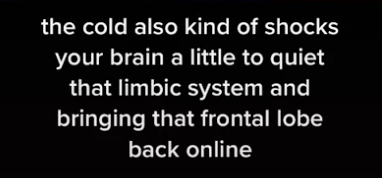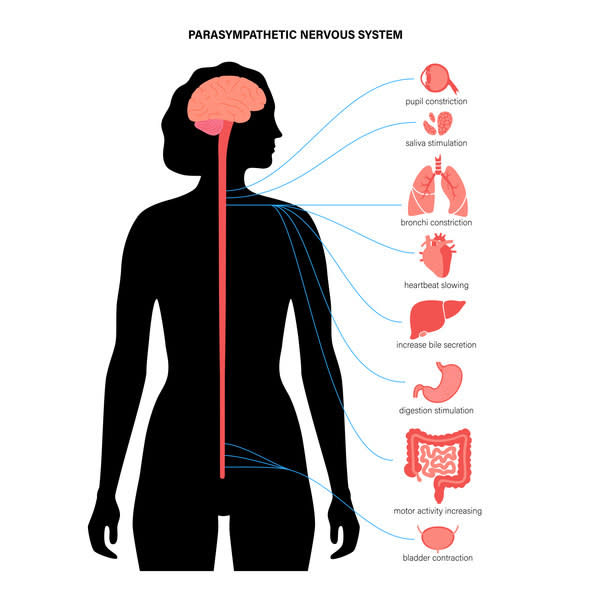I Tried Submerging My Face In Freezing Cold Water To Help With Stress — Here's How It Went
I — like most people — am known to get a little (or, tbh, a lot) anxious from time to time. I'm currently not medicated for my anxiety*, but I'm always looking for different ways to help quell my fight-or-flight instinct when it pops up.
E!
*For the record, there's absolutely nothing wrong with using medication to help with your mental health! It's just not something I've had the opportunity to pursue at this time.
Cut to me scrolling through TikTok, and I stumble across this video by @justtherapythings — a licensed clinician therapist and master social worker — where she stitches another user, @yung_kelz, dunking their face in ice water to help with a "dis-regulated nervous system," racing thoughts, and a lack of focus:
@justtherapythings #duet with @yung_kelllz WE LOVE TIPPS, way to use your skills! #tiktoktherapist #therapytok #fyp #copingskills #dbt #CowboyBebop #ASOSChaoticToCalm
♬ original sound - yung_kelllz
In her stitch, which has over a million views, @justtherapythings describes this method as TIPPS and explains why it can actually help relieve stress!

She also explains how the cold water works to kind of "shock your brain" into calming back down.

I was intrigued by all this, so I reached out to Just Therapy Things (JTT) for more info. JTT told BuzzFeed that the TIPPS method stands for temperature, intense exercise, paced breathing, and paired muscle relaxation, and it's actually part of a larger form of therapy called Dialectical Behavior Therapy (DPT). "As a distress tolerance skill, [TIPPS is] ideal to use during times of heightened stress (like a panic attack), because during these moments, your limbic system is in charge."

According to the Queensland Brain Institute, the limbic system is the part of our brain that deals with behavioral and emotional responses, and it includes the hippocampus and the amygdala.
She continued, "The limbic system is the brain's fire alarm and where trauma memories are stored. When your limbic system is in charge, your frontal lobe (logical thinking, language, context, rational decisions, etc.) is not working. When you dunk your face into ice water, it can quickly snap you out of that state of panic and brings your frontal lobe back online, which can allow you to use more cognitive grounding tools to stay regulated."

JTT also mentioned how dunking your face in cold water can trigger your Mammalian Dive Reflex, which "causes the heart to slow down to below resting heart rate, when the person is immersed in very cold water without oxygen. This effect happens because of increased activation of the parasympathetic nervous system, which is the body's system of decreasing arousal (it's what kicks in when the danger is over, and we can "come down").

All of this sounded absolutely fascinating to me, so I decided to try it for myself. On a day where I was feeling particularly stressed out, I pulled my hair back, grabbed a bowl of cold water, filled it with ice, and prepared to dunk my face.

Please enjoy yet another group of unflattering pictures I'm putting on the internet for science.
I tried to drunk my face in 30-second intervals, since JTT said that's what Marsha Linehan (the creator of the DBT workbook) recommends, but right off the bat, it was just too much. The shock of the cold water — plus the challenge of holding my breath — took way too much getting used to. I whipped my head back out after only about 5 seconds.

But I wasn't about to be deterred! I decided to try again and switch to 15-second intervals to make things more manageable. I also put my hair up some more because my ponytail was not the business in that moment.

I'll say right off the bat that in the moment, keeping my face in ice cold water wasn't fun. It didn't feel particularly good and by the end of every 15 seconds, I was truly uncomfortable.

BUT after each dunking session, I actually emerged from the water feeling much better! I felt an overwhelming sense of calm immediately after and could think more clearly than before. By the end of the fourth dunk, I felt almost completely serene, which is a pretty big deal considering I almost never feel that way. I didn't expect to genuinely feel a lot of improvement after this exercise, but I really did!
E!
Just Therapy Things told BuzzFeed that since she's primarily a trauma therapist, she recommends this to a number of her clients. "Someone is a good candidate for this if they have frequent panic or anxiety attacks they're struggling to manage, or if they're struggling with resisting self-harm behaviors."
TEN
However, she also made sure to mention that an exercise like this is not the whole picture: "It's important to note that while this skill is great, it's not the end-all-be-all or a quick fix for panic attacks. It will give you the breathing space to regulate further once you're able to think more clearly, but I highly recommend working with a therapist who can help you identify other skills to use in conjunction with this one for long-term benefits."
NBC
She continued, "It's a great skill for surviving distress in the moment, but there are so many other skills that need to be paired with this one, especially if panic or anxiety attacks, or self-harm, are a regular and consistent struggle. Learning your triggers, your body cues, and what type of things ground you are all important skills that should be explored with a licensed therapist."
As for any safety precautions we should be aware of, JTT told BuzzFeed, "Individuals who have heart conditions absolutely should consult with their physician before trying this skill. Since it decreases your heart rate so quickly, it's very important to make sure someone's heart is in good condition to handle that kind of drop. Folks who are struggling with anorexia or bulimia nervosa also should consult with a physician prior to participating in this skill. If you don't have any of these conditions and are still nervous, when in doubt, ask your doctor."
CBS
"Additionally, please don't dunk your face in water for an extended period of time if the water is below 50 degrees Fahrenheit. Just know that's gonna hurt!"
JTT closed out our interview by acknowledging that therapy can be really inaccessible and expensive for lots of people. If you're looking for affordable therapy, she recommends Open Path Collective or Inclusive Therapists as resources. Both are databases where therapists list themselves on a sliding pay scale.
VH1
Note: A sliding pay scale is a payment model that determines the cost of services based on your level of income, making things much more accessible and fair.

